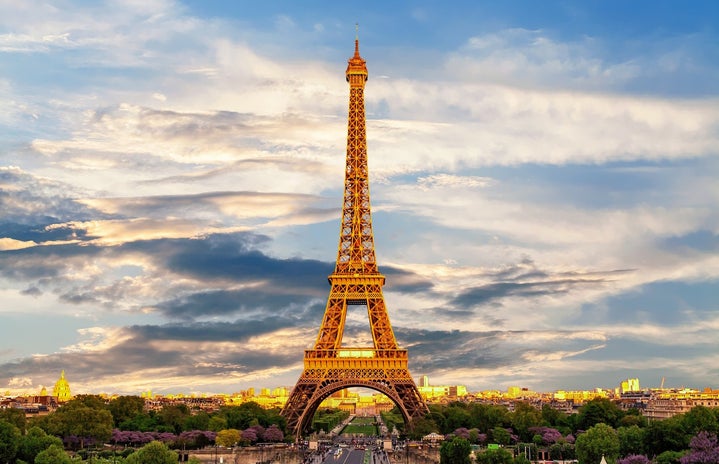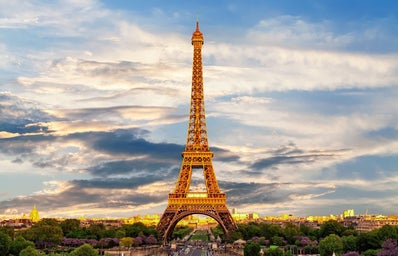Although it was not graced by the electrifying bop of Big Ben, our official departure from the European Union on 31st January does not need to instead be filled with the deafening silence of impending doom. There is no better time to plan your second life in the French capital: new Brexit deal, new you.
For those of us who are not necessarily prepared to abandon our degrees just yet (although all non-first years have absolutely fantasised about it), it is worth delaying your self-exile until reading week. An EasyJet ticket from Bristol Airport to Charles de Gaulle for 2nd March currently costs just £20. This also provides you with time to brush up on your French GCSE and channel your inner Romy Schneider. Alternatively, of course, you can simply apply to Love Island for the additional benefit of avoiding the coronavirus, at the cost of culture and sanity.
Moving In
Once landed in Paris, there are various methods of getting from the airport to the city centre, all of which must be done without a smile – resting bitch face is highly advised! The cheapest way is to take the RER train into Paris, at €10.30 a ticket which can be bought at the airport, and this ticket can be used again for further connections and transfers onto Métro trains (though an additional Paris Ticket T+ is required if you wish to use buses or trams). Otherwise, there is a coach which can take you directly to the Tour Eiffel for €18 and of course, if you are feeling fancy, there are plenty of taxis.
La clé to feigning Parisian-ness is to adopt a permanent expression of discontent. Be so bold as to flash a smile at a passerby, or an anxious twitch of the lips for fear of seeming cold, and you will be immediately registered as a tourist and subjected to one of the most brazen of social cruelties: the refusal of reciprocation. So, when admiring the Eiffel Tower, try to appear as indifferent as a fourth-year student walking past Wills Memorial Building.
When making small-talk, follow the example of Dominique from Françoise Sagan’s ‘A Certain Smile’, who desires only to ask people “Are you in love? What are you reading?”, specifically in that order. Not only will this make you seem intellectual and enigmatic amongst your new neighbours, but it is also a very efficient form of breaking the ice and getting to the crux of the matter, particularly compared to the university ritual exchange of “What do you study? Where are you from?”. Furthermore, apply this at pre-drinks and you will instantly be the most popular person in the over-crowded kitchen.
Getting Around
Les grèves have crippled Paris transport in recent weeks, with strikes on buses, Métro lines and trains over President Emmanuel Macron’s planned pension reforms. This has resulted in streets newly bustling with pedestrians, unhabitual cyclists, scooters, and cars. However, this has also exposed how walker-friendly Paris is.
Whilst by March the city will most likely be humming again with rattling railways and beeping buses in time for your hiatus, a map recently published by Le Parisien details the times of various walking routes around the city, uncovering just how easily the city can be mastered on foot (appropriately-adorned, of course!): besides the Palais de Versailles, many of the most attractive areas in Paris are within an hour’s walk of the major train hub Châtelet–Les Halles, and train station Gare du Nord is only a 30-minute walk from the centre. Unlike Bristol, Paris is not situated amidst severely undulating hills, so you can confidently stride with the knowledge that glute workouts here are entirely optional.
You can buy a carnet of 10 Métro tickets from any station, which can also be used on buses, for €14.90. When boarding the bus, you need to bid a polite “Bonjour” to your driver before remembering to validate your ticket in one of the little machines.
There are also various safe cycling routes, which you can experience with either the Vélib or Uber Jump bikes. Alternatively, if you are a particularly spontaneous individual who took a gap-yah before moving into Wills, owns AirPods, and/or finds the idea of annoying the already unamused locals appealing, the somewhat precarious-looking Lime Scooters which decorate almost every street are for you.
What to do
If you fancy a break from enjoying Paris’s renowned café culture and people-watching from the 15th Arrondissement’s up-and-coming L’Oustal, or pensively posing in a black turtleneck awaiting your Jean-Paul Sartre (if that is literally your type on paper) in Les Deux Magots, there is always a wealth of exhibitions to explore, such as the ‘Versailles Revival 1867-1937’ hosted at the Palais de Versailles until 15th March.
However, if you are exhausted from the feat of queuing and jostling to visit the Eiffel Tower, or from navigating through the traffic for your Instagram post by the Arc de Triomphe, the Musée de l’Orangerie is a small museum with bright rooms dedicated to Monet’s serene ‘Water-Lilies’. The Musée de Rodin is a stunning manor through which you will be accompanied by numerous sculptures, including ‘The Thinker’.
The distracting windows displays of patisseries and boulangeries border every street. In Paris, eating bread alone as a snack is not associated with the nocturnal cravings of a student fuelling to finally face their essay, but is considered chic. So, stuff your baguette into a tote bag and peruse the streets avec l’air of someone too preoccupied with philosophical thoughts to meal-plan.
Brexit May Not Mean (Continental) Breakfast
Whilst fleeing to Europe, even if just for reading week, is not a feasible option for many, we can at least strive to incorporate some of the French culture and mentality into our daily lives in the upcoming months. Amidst the anxiety, uncertainty, and even depression over Brexit and politics globally, take time to visit museums, read, listen to music and enjoy engaging in elements of our culture which are so entwined with others. It has never been so critical to listen to and understand others, and therefore art as a medium through which to do this has never been so important. In ‘The Blood of Others’, Beauvoir opens with Dostoyevsky’s quote: ‘Each of us is responsible for everything and to every human being’ – it is compassion towards each other (yes, even the uncle who shares questionably sourced, unquestionably racist Facebook posts) and ourselves which is needed.





